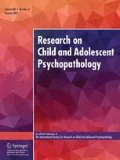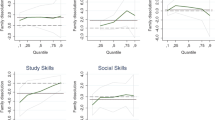Abstract
Compared the impact on families of young children with externalizing behaviors (e.g., hyperactive, aggressive; n=22), autism (n=20), or no significant problem behaviors (n=22) on several measures of family functioning. Previous studies have found heightened stress and parental maladjustment in families with externalizing children. The present study expanded upon that literature by (1) including a clinical control group to determine the specific impact of externalizing problems, (2) focusing on preschool aged children, and (3) using a new measure to directly ascertain parents' perception of impact. Compared to parents with normally developing children, parents with externalizing children reported more negative impact on social life, more negative and less positive feelings about parenting, and higher child-related stress. Moreover, parents of externalizing children reported levels of impact and stress as high as those reported by parents of children with autism. On broader measures of parental and marital wellbeing, however, the three groups of families of preschoolers did not differ. The implications of these findings for intervention are discussed.
Similar content being viewed by others
References
Abidin, R. R. (1990). Parenting Stress Index manual (3rd ed.). Charlottesville, VA: Pediatric Psychology Press.
Abidin, R. R., Jenkins, C. L., & McGaughey, M. C. (1992). The relationship of early family variables to children's subsequent behavioral adjustment.Journal of Clinical Child Psychology, 21, 60–69.
Achenbach, T. M., & Edelbrock, C. (1983).Manual for the Child Behavior Checklist and Revised Child Behavior Profile. Burlington: University of Vermont, Department of Psychology.
American Psychiatric Association. (1987).Diagnostic and statistical manual of mental disorders (3rd ed., revised). Washington, DC: Author.
Baker, B. L., Landen, S. J., & Kashima, K. J. (1991). Effects of parent training on families with children who are mentally retarded: Increased burden or generalized benefit?American Journal on Mental Retardation, 96, 127–136.
Barkley, R. A. (1984). The social interactions of hyperactive children: Developmental changes, drug effects, and situational variation. In R. McMahon & R. Peters (Eds.),Childhood disorders: Behavioral-developmental approaches. New York: Brunner/Mazel.
Barkley, R. A. (1990).Attention-deficit hyperactivity disorder: A handbook for diagnosis and treatment. New York: Guilford Press.
Barkley, R. A., Karlsson, J., & Pollard, S. (1985). Effects of age on the mother-child interactions of hyperactive boys.Journal of Abnormal Child Psychology, 13, 631–637.
Beck, A., Ward, C., Mendelson, M., Mock, J., & Erbaugh, J. (1961). An inventory for measuring depression.Archives of General Psychiatry, 4, 53–63.
Befera, M., & Barkley, R. A. (1985). Hyperactive and normal girls and boys: Mother-child interactions, parent psychiatric status, and child psychopathology.Journal of Child Psychology and Psychiatry, 26, 439–452.
Bell, R. Q., & Harper, L. V. (1977).Child effects on adults. Hillsdale, NJ: Erlbaum.
Belsky, J. (1984). The determinants of parenting: A process model.Child Development, 55, 83–96.
Blacher, J. (1984).Severely handicapped young children and their families: Research in review. Orlando: Academic Press.
Breen, M. J., & Barkley, R. A. (1988). Child psychopathology and parenting stress in girls and boys having attention deficit disorder with hyperactivity.Journal of Pediatric Psychology, 13, 265–280.
Bristol, M. M. (1987). Mothers of children with autism or communication disorders: Successful adaptation and the double ABCXD model.Journal of Autism and Developmental Disorders, 17, 469–486.
Brody, G. H., & Forehand, R. (1986). Maternal perceptions of child maladjustment as a function of the combined influence of child behavior and maternal depression.Journal of Consulting and Clinical Psychology, 54, 237–240.
Campbell, S. B. (1975). Mother-child interaction: A comparison of hyperactive, learning disabled, and normal boys.American Journal of Orthopsychiatry, 45, 51–57.
Campbell, S. B., Breaux, A. M., Ewing, L. J., & Szumowski, E. K. (1986). Correlates and predictors of hyperactivity and aggression: A longitudinal study of parent-referred problem preschoolers.Journal of Abnormal Child Psychology, 14, 217–234.
Campbell, S. B., & Ewing, L. J. (1990). Follow-up of hard-to-manage preschoolers: Adjustment at age 9 and predictors of continuing symptoms.Journal of Child Psychology and Psychiatry, 31, 871–889.
Crnic, K. A., & Greenberg, M. T. (1990). Minor parenting stresses in young children.Child Development, 61, 1628–1637.
Cunningham, C. E., & Barkley, R. A. (1979). A comparison of the interactions of hyperactive and normal children with their mothers in free play and a structured task.Child Development, 30, 217–224.
Cunningham, C. E., Benness, B. B., & Siegel, L. S. (1988). Family functioning, time allocation, and parental depression in families of normal and ADDH children.Journal of Clinical Child Psychology, 17, 169–177.
Dadds, M. R., Schwartz, S., & Sanders, M. R. (1987). Marital discord and treatment outcome in behavioral treatment of child conduct disorders.Journal of Consulting and Clinical Psychology, 55, 396–403.
Egeland, B., Kalkoske, M., Gottesman, N., & Erickson, M. F. (1990). Preschool behavior problems: Stability and factors accounting for change.Journal of Child Psychology and Psychiatry, 31, 891–909.
Erhardt, D., & Baker, B. L. (1990). The effects of behavioral parent training on families with young hyperactive children.Journal of Behavior Therapy and Experimental Psychiatry, 21, 121–132.
Fewell, R. (1986). A handicapped child in the family. In R. Fewell & P. Vadasy (Eds.),Families of handicapped children: Needs and supports across the life span (pp. 3–34). Austin, TX: Proed.
Fischer, M. (1990). Parenting stress and the child with attention deficit hyperactivity disorder.Journal of Clinical Child Psychology, 19, 337–346.
Forehand, R., Wells, K., & Griest, D. (1980). An examination of the social validity of a parent training program.Behavior Therapy, 11, 488–507.
Gibaud-Wallston, J., & Wandersman, L. P. (1978, August).Development and utility of the Parenting Sense of Competence Scale. Paper presented at the annual meeting of the American Psychological Association, Toronto.
Greenfeld, J. (1973).A child called Noah. New York: Warner Books.
Griest, D. L., & Forehand, R. (1982). How can I get any parent training done with all these other problems going on? The role of family variables in child behavior therapyChild and Family Behavior Therapy, 4, 73–80.
Hetherington, E. M., & Martin, B. (1986). Family factors and psychopathology in children. In H. Quay & J. Werry,Psychopathological disorders of childhood (3rd ed.). New York: Wiley.
Hinshaw, S. P. (1992). Externalizing behavior problems and academic underachievement in childhood and adolescence: Causal relationships and underlying mechanisms.Psychological Bulletin, 111, 127–155.
Hodapp, R. M., Dykens, E. M., Evans, D. W., & Merighi, J. R. (1992). Maternal emotional reactions to young children with different types of handicaps.Journal of Developmental and Behavioral Pediatrics, 13, 118–123.
Hollingshead, A. B. (1975).Four-Factor Index of Social Status. New Haven, CT: Yale University, Department of Sociology.
Johnson, S. M., & Lobitz, G. R. (1974). The personal and marital status of parents as related to observed child deviance and parenting behaviors.Journal of Abnormal Child Psychology, 3, 193–208.
Johnston, C. (1989).Behavioral parent training with families of attention deficit and conduct disordered children. Unpublished manuscript, University of British Columbia, Department of Psychology, Vancouver.
Johnston, C., & Mash, E. J. (1989). A measure of parenting satisfaction and efficacy.Journal of Clinical Child Psychology, 18, 167–175.
Karoly, P., & Rosenthal, M. (1977). Training parents in behavior modification: Effects on perceptions of family interaction and deviant child behavior.Behavior Therapy, 8, 406–410.
Maddux, J. E., Eyberg, S. M., & Funderburk, B. W. (1989). Parent-child interaction therapy: Issues in case management of early childhood conduct problem behaviors. In M. C. Roberts & C. E. Walker (Eds.),Casebook of child and pediatric psychology (pp. 161–175). New York: Guilford Press.
Mash, E. J., & Johnston, C. (1982). A comparison of the mother-child interactions of younger and older hyperactive and normal children.Child Development, 53, 1371–1381.
Mash, E. J., & Johnston, C. (1983). Parental perceptions of child behavior problems, parenting self-esteem, and mothers' reported stress in younger and older hyperactive and normal children.Journal of Consulting and Clinical Psychology, 51, 86–99.
Mash, E. J., & Johnston, C. (1990). Determinants of parenting stress: Illustrations from families of hyperactive children and families of physically abused children.Journal of Clinical Child Psychology, 19, 313–328.
Morrison, J. R. (1980). Adult psychiatric disorders in parents of hyperactive children.American Journal of Psychiatry, 137, 825–827.
Pisterman, S., McGrath, P., Firestone, P., Goodman, J. T., Webster, I., & Mallory, R. (1989). Outcome of parent-mediated treatment of preschoolers with attention deficit disorder with hyperactivity.Journal of Consulting and Clinical Psychology, 57, 628–635.
Reid, W. J., & Crisafulli, A. (1990). Marital discord and child behavior problems: A meta-analysis.Journal of Abnormal Child Psychology, 18, 105–117.
Rodrigue, J. R., Morgan, S. B., & Geffken, G. (1990). Families of autistic children: Psychological functioning of mothers.Journal of Clinical Child Psychology, 19, 371–379.
Ross, D. M., & Ross, S. A. (1982).Hyperactivity: Current issues, research, and theory (2nd ed.). New York: John Wiley and Sons.
Spanier, G. B. (1976). Measuring dyadic adjustment: New scales for assessing quality of marriage and similar dyads.Journal of Marriage and Family Therapy, 38, 15–28.
Tarver-Behring, S., Barkley, R., & Karlsson, S. (1985). The mother-child interactions of hyperactive boys and their normal siblings.American Journal of Orthopsychiatry, 55, 202–209.
Wahler, R. B. (1980). The insular mother: Her problems in parent-child treatment.Journal of Applied Behavior Analysis, 13, 207–219.
Webster-Stratton, C. (1985). Predictors of treatment outcome in parent training for conduct disordered children.Behavior Therapy, 16, 223–243.
Webster-Stratton, C. (1988). Mothers' and fathers' perceptions of child deviance: Roles of parent and child behaviors and parent adjustment.Journal of Consulting and Clinical Psychology, 56, 909–915.
Whalen, C. (1987). Attention deficit and hyperactivity disorders. In T. H. Ollendick & M. Hersen (Eds.),Handbook of child psychopathology (2nd ed.). New York: Plenum Press.
Author information
Authors and Affiliations
Additional information
This research was conducted at the Fernald Child Study Center, University of California at Los Angeles. We wish to thank Jan Blacher, Doug Granger, Stephen Hinshaw, and Karen Rudolph for comments on an earlier version of this article, and Kenny Smith and Doug Granger for computer help. We also appreciate the assistance of our colleagues on the Preschool Project, Drew Erhardt, Tracy Heller, Barbara Henker, Alice Huber, Blair Paley, Karen Rudolph, and Jennifer Treuting.
Rights and permissions
About this article
Cite this article
Donenberg, G., Baker, B.L. The impact of young children with externalizing behaviors on their families. J Abnorm Child Psychol 21, 179–198 (1993). https://doi.org/10.1007/BF00911315
Revised:
Issue Date:
DOI: https://doi.org/10.1007/BF00911315



